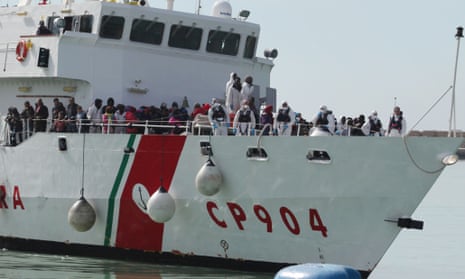More than 1000 refugees have been saved in the Mediterranean north of Libya in the past two days but 10 people died at sea, Italian officials have said.
A flotilla of rescue vessels, including from Italy’s coastguard and navy, and three cargo ships saved 941 people in seven separate operations on Tuesday. On Wednesday, the coastguard and two cargo ships rescued 94 migrants whose motorised dinghy was in distress 40 miles (65 km) north of Libya.
Survivors were ferried to southern Italian ports. The migrants rescued on Tuesday had been aboard five motorised dinghies and two larger vessels. One of the larger boats capsized and 10 people were later found dead.
For months now, hundreds – sometimes thousands – of migrants fleeing conflicts or poverty have been reaching Italy every week on smugglers’ boats from Libya.
Italy’s interior ministry said 7,882 migrants arrived in the first two months of this year, compared to 5,506 over the same time in 2014. A total of 170,000 migrants and asylum seekers were rescued at sea by Italy’s coast guard, navy and other vessels including cargo ships last year. It is believed the tally will be higher this year.
The coastguard said the migrants saved in the latest rescues claimed to be Syrians, Palestinians, Libyans, Tunisians and people from sub-Saharan Africa.
More than 30 children were among those rescued. One of the 50 pregnant women aboard was urgently evacuated for medical treatment.
A tug deployed at offshore oil platforms raised one of the first alarms before joining in the rescue operations about 50 miles north of Libya, the coast guard said.
For years, Italy has been appealing to the EU to help with ships, aircraft or funding. It points out that most of those rescued intend to reach relatives or jobs in other European countries.
This year, an EU patrol mission known as Triton replaced Italy’s Mare Nostrum air and sea mission that had saved tens of thousands of lives. Triton patrols only EU national waters, while the Italians had carried out rescues off Libya’s coast, where many of the unseaworthy and overcrowded vessels founder.
Italy says it won’t turn its back on those in danger. “Often the SOS call [arrives] when the migrant boats are outside the Italian rescue zone, 50 or 60 miles from the Libyan coast,” the coastguard commander Filippo Marini told the AP.
International law obliges Italy to alert the coastal country with jurisdiction, he said, but calling on Libyan authorities would yield little help due to the country’s chaotic security situation.
“If there is no reaction or intervention for this country, we must rescue these people,” Marini said.
The EU’s smaller-scale mission is fodder for rightwing Italian politicians, including Matteo Salvini, the leader of the anti-immigrant, anti-Europe Northern League party.
“Ten more dead and 900 clandestine migrants ready to disembark,” Salvini said on Wednesday. “In Rome and in Brussels, there are full pockets and hands stained with blood.”
The migrants’ traffickers are reportedly getting even more ruthless. An Italian child protection advocate, Carlotta Bellini of Save the Children, said migrants have recently reported that armed traffickers demanded they jump into the boat and depart even if weather is bad.
Italian lawmakers also demanded the EU do more. Khalid Chaouki, from premier Matteo Renzi’s Democratic party, lamented “this unexplainable European indifference”.
In Brussels, the migration commissioner, Dimitris Avramopoulos, told reporters: “Now more than ever we need a comprehensive and long-term strategy.” He spoke after a commission orientation debate on the EU’s new migration policy.
Italian officials have expressed concern that militants could mingle among migrants from Libya, where a group affiliating itself with Islamic State (Isis) has gained a foothold.
